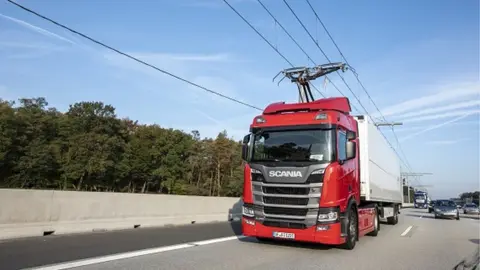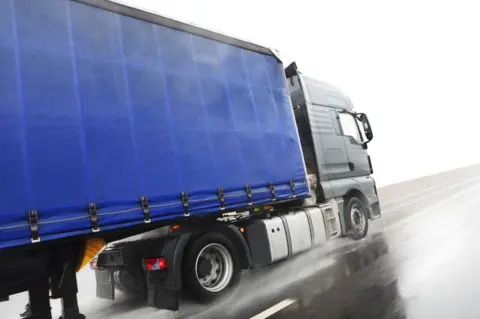M180 'eHighway' trial: Jobs boost hope over electrified m-way scheme
 Costain
CostainA trial of the UK's first "eHighway" could lead to "new technology and new jobs", according to a consortium researching sustainable travel.
A feasibility study is currently under way in North East Lincolnshire into a trial motorway electrification scheme.
It would see electric Heavy Goods Vehicles recharging while travelling along motorways using overhead wires.
If the study opens the way to a pilot scheme, about 19 miles (30km) of the M180 could be electrified for HGVs.
Known as dynamic charging, it could also reduce the amount of equipment needed for static charging by lorries, the consortium behind the project says.
If given the go-ahead, it would see the Port of Immingham in North East Lincolnshire partly linked by electrified motorway to Doncaster and the town's nearby airport.
Justin Moss, of Siemens Mobility, a member of the consortium carrying out the feasibility study, told BBC Radio Humberside if a trial scheme went ahead and proved successful, it could lead to "new technology, new jobs".
Mr Moss said charging electric trucks on the move "would reduce carbon by reducing the amount of batteries needed by [electric] trucks".
He added: "Overhead lines like rail technology could be used on motorways to try and reduce emissions."
Dynamic charging of electric lorries would "complement plans" to reduce carbon by moving more freight by rail, Mr Moss said.
 Getty Images
Getty ImagesThe nine-month feasibility study in North East Lincolnshire into whether the dynamic charging technology is ready for use on the UK's roads is being undertaken by a consortium including Costain, Siemens, Scania, several universities and other businesses.
The Department for Transport commissioned the group last year to assess the plan's potential.
The study, which aims to reduce carbon emissions by road freight to zero, is one of a number using £20m of government funding.
Heavy lorries emit 18% of all vehicle CO2 emissions, despite being just over 1% of vehicles on the UK's road and representing 5% of miles driven, said the consortium.
Mr Moss said power for the overhead charging lines would come "from green energy as much as we can".
A similar trial scheme in Germany had been "really successful" and the system was also being tried in Sweden and the USA, he said.
The feasibility study is due to report at the end of March.

Follow BBC East Yorkshire and Lincolnshire on Facebook, Twitter, and Instagram. Send your story ideas to [email protected].
